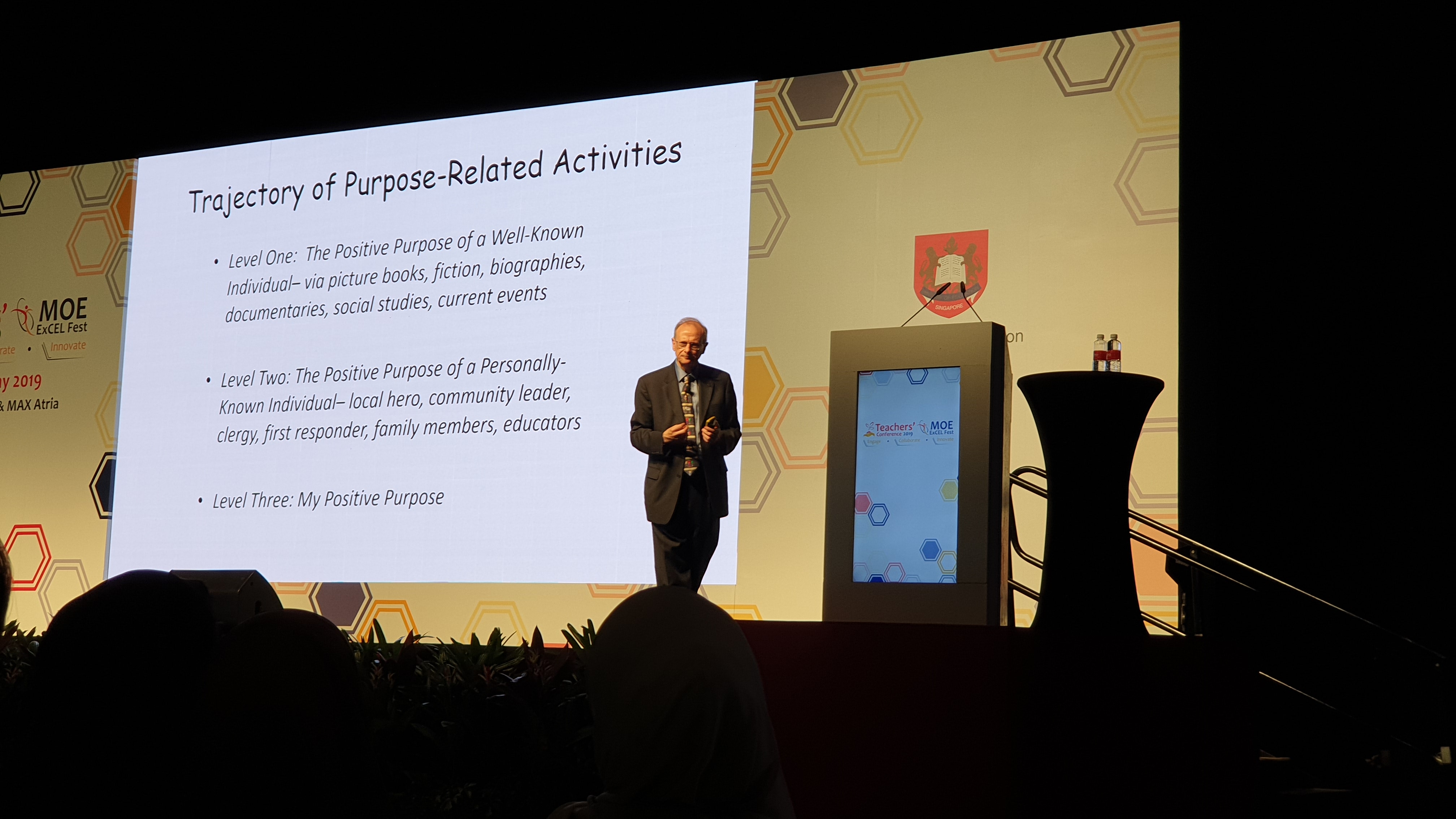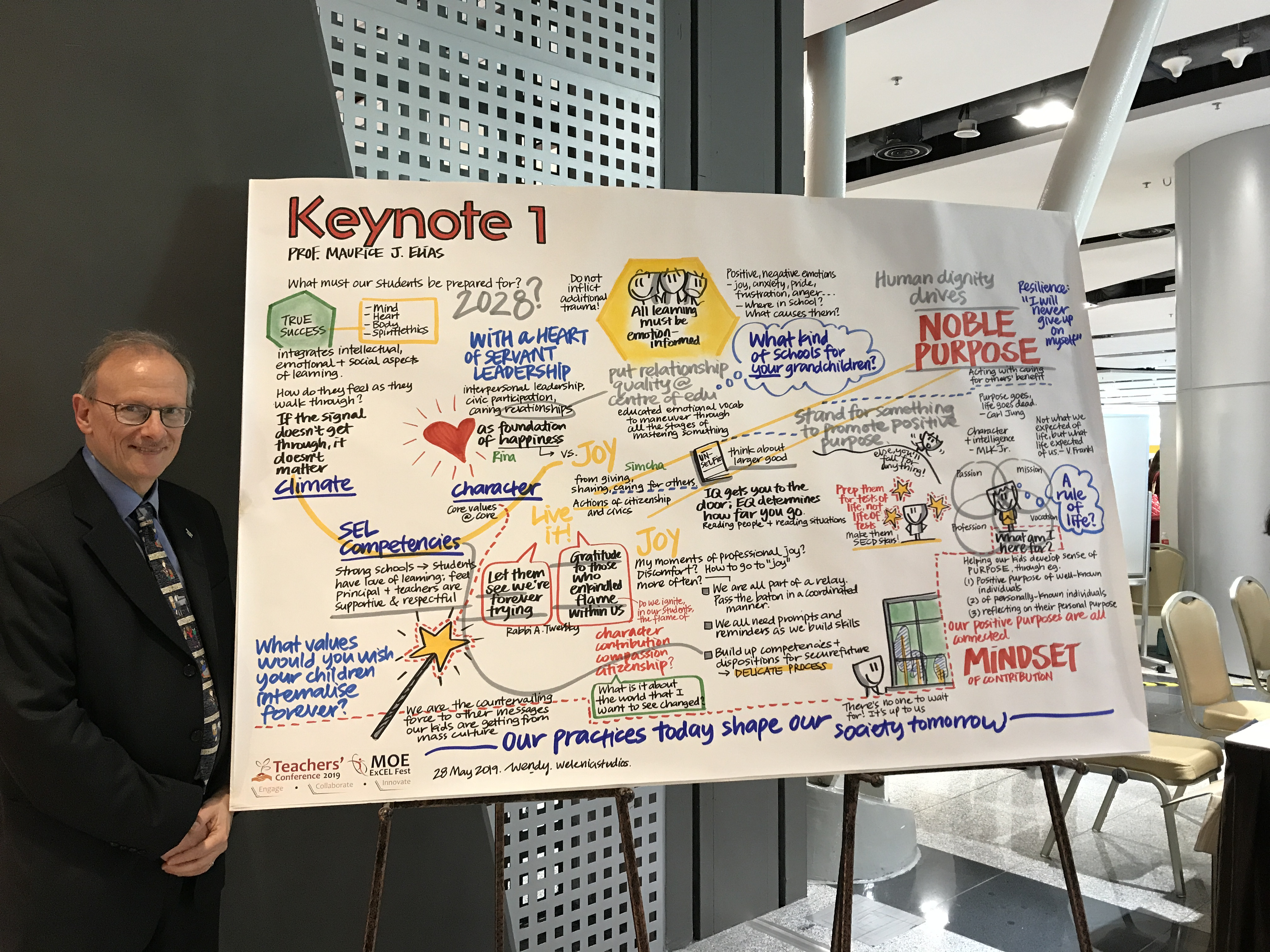Young Children’s Voices in Mathematical Problem Solving
Contributed by Dr Ho Siew Yin and Sng Wei Qin Abbie, from NTUC First Campus, for SingTeach Virtual […]
Read More
While intellectual intelligence can open many doors for an individual, emotional intelligence is the key quality that determines how far one goes in life. In his keynote address at Teachers’ Conference 2019, Professor Maurice Elias explains the role that social-emotional learning and character development play in nurturing students to become successful and participatory citizens.

Professor Maurice Elias giving his keynote address at Teachers’ Conference 2019.
The 2016 World Economic Forum highlighted that traditional academic competencies are no longer sufficient in preparing students for future jobs.
In fact, there are employers that do not even take test scores into account when making hiring decisions – one such employer is Google. Instead, what the search engine giant looks for in prospective employees are qualities such as teamwork, humility, adaptability and the ability to think outside the box.
As educators, we therefore have to go beyond imparting content knowledge and also focus on nurturing our students to be adaptable, good communicators, strong team players and effective problem-solvers – these are not merely social-emotional attributes that Google values in an employee, but the very competencies that are foundational to future success.
A key galvanizing ingredient to social-emotional and character development is positive purpose, which is the intention to accomplish something that is personally meaningful and in the service of a greater good. Having a sense of purpose is important for students as it keeps them grounded and empowers them to be engaged and contributing citizens in society.
So what can schools do to help students develop a strong sense of purpose?
For a start, educators have to guide students in identifying their strengths and talents as well as affirm their potential to be positive contributors in society. One way they can achieve this is to engage students in conversations about a fictional character or historical figure’s purpose and ask them to think about the character’s goal or why the figure made a particular decision.
When students reflect on how prominent characters or individuals have positively impacted society, they would also develop an understanding about how a sense of purpose guides human behaviour and actions. In doing so, they are better equipped to think about and articulate their own sense of purpose, which would eventually energize them to put their learning to constructive use and cooperate for social actions.
Of course, students’ thoughts about their positive purpose will change over time, as they experience different life events and discover new areas of interest in and out of school. One should therefore not be surprised to observe changes in students’ behaviour during a period of time when a positive purpose they once held becomes weakened or eliminated, or when they discover a new one after a period of searching.
“Educators have to guide students in identifying their strengths and talents as well as affirm their potential to be positive contributors in society.”
– Professor Maurice Elias, on one of the few things teachers can do to help students develop a strong sense of purpose
Apart from helping students find their own purpose, schools must also have strong social-emotional learning (SEL) programmes in place to help learners acquire the dispositions that would take them far in life.
Within the United States, there is data that demonstrate a link between a school’s commitment to SEL and students’ achievement outcomes. In high schools with strong SEL programmes, not only do students perceive their teachers and principals to be supportive, they are also more motivated to strive for excellence in their pursuits.
Personally, I have worked with a middle school that had many students who were not only struggling academically, but also presented with disciplinary problems. The school’s numerous attempts to remediate students’ poor academic performance bore little success, so it decided to take a different route – make SEL and character development a priority.
In a process that lasted six years, the school became a “National School of Character” and the test scores of students improved. These outcomes are precisely the result of the school’s commitment to SEL, which translated into a more nurturing learning environment, where students felt supported by their educators and were motivated to do their best. In fact, the students also gradually developed a love for learning and in the process, started to focus on what they can do with the knowledge they have gained.

All learning must be emotion-informed and as educators, we have to recognize that learning involves many emotions, ranging from curiosity, excitement and delight to confusion, frustration, stress and anxiety.
If students experience negative emotions such as anxiety or frustration over the course of learning a subject matter, they would not enjoy the process of learning. After all, it is difficult to love anything that is a source of stress.
Nevertheless, negative emotions need not hinder learning or preclude a love for learning, for they are part and parcel of the process. Educators thus have to work with students to help them recognize and manage the emotions they are experiencing so that they would remain motivated to learn. Eventually, we can cultivate a love for learning in our students.
Ultimately, we cannot love what we do only when the results we desire come easily; we must also develop a love for the progress and the trajectory. In doing so, we would better appreciate our successes and achievements. Furthermore, overcoming challenges in learning is often anchored by having a strong sense of positive purpose, and feeling supported in your learning and goals by the adults and peers in your environment. This is as true for adults as it is for students!
“All learning must be emotion-informed and as educators, we have to recognize that learning involves many emotions, ranging from curiosity, excitement and delight to confusion, frustration, stress and anxiety.”
– Professor Maurice Elias believes that it is important to acknowledge emotions as educators
Many of us chose to become educators because we are committed to developing our students’ characters and want them to contribute to society positively.
We therefore cannot regard SEL programmes to be less important than academic subjects as socialemotional competencies are what enable students to become active and engaged citizens who contribute their talents for greater causes.
Furthermore, we must also believe in our students if we want them to succeed in life. There are students who, despite having given up on themselves, turned a corner because they had a teacher who provided care and support but most of all, believed in them.
All of us have the capacity to ignite our students’ flames of character, contribution, compassion and engaged citizenship. It is thus our responsibility to prepare them not only for a life of tests, but also for the tests of life.